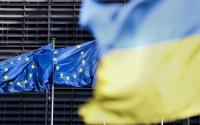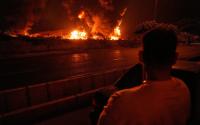23 July 2008
The arrest of Radovan Karadzic has caused rejoicing in the streets of Bosnia and Croatia, where his brand of violent nationalism resulted in tens of thousands of dead and hundreds of thousands displaced. It should also be the cause of some congratulation in Brussels and Western Europe. It was the Serbs who, under a new pro-Western government, who finally and belatedly arrested the man so reviled by his enemies after 12 years in disguise. But it was the lure of membership of the European Union, and the steady demand by European leaders that Serbia first bring its war criminals to justice, that drove them to it.
Far from the usual image of a butcher, Karadzic is a man of many parts: poet, psychiatrist, psychologist to the Red Star Belgrade football team. As populist leader of the Bosnian Serbs, he was also responsible, on the indictment by the Hague Tribunal on war crimes, of complicity in genocide, extermination, murder, wilful killing, persecution, deportation, taking of hostages and other inhumane acts. Nato ended his run in 1995 – not before time it should be said, but failed to bring the man to book.
Its soldiers conducted dozens of raids to apprehend him. They burst into Serbian Orthodox monasteries and scoured mountain caves in remote eastern Bosnia. They stormed the homes of his children. They even searched the sewage tank at his wife's house. Through it all there were those, like Carla del Ponte, the former UN chief prosecutor, who insisted that the war crimes fugitive was hiding in the Serbian capital, Belgrade, under the protection of hardliners in the security services. His whereabouts must have been well known to the authorities. What was preventing his arrest was only political will.
In the event, Karadzic was captured not in some remote romantic Montenegran hideout of the kind which might have been conjured in his cliché-ridden nationalist poetry. He was arrested on a Belgrade bus just days after the formation of a pro-Western coalition government pledged to pursue EU membership. He had been living in the city, albeit disguised with a bushy white beard, and walking freely around the place, apparently for a considerable time. It all suggests the decisive factor behind his capture was political resolve.
So what changed? The journey out of the nationalist mindset has been an exceeding slow one for the Serbs. The architect of the Balkans wars, Slobodan Milosevic, was ousted in 2000 and replaced by a fragile coalition government whose prime minister was assassinated in 2003 after sending Milosevic to the Hague. Even today, one in three Serbs still vote for parties which consider Karadzic a hero and hold that the international court in The Hague is biased against Serbs. But the national psyche was rocked in 2005 when a video of Bosnian Serb soldiers shooting captives from Srebrenica shocked television viewers in the former Yugoslavia. In 2006, Serbs voted in a referendum to replace the Milosevic-era constitution with a new one. Under it a coalition government was elected which earlier this year reached stalemate over what to do with the exhausted Serbian economy.
The faction led by the centre-left President, Boris Tadic, saw the answer in membership of the European Union, which would give Serbia open access to a huge new market. Serbia, the largest of the republics of the former Yugoslavia and the first to break away from it, was being left behind. Neighbouring Slovenia had joined the EU in 2004. Croatia began entry talks the following year, after tipping off UN investigators to the whereabouts of a Croatian war crimes suspect. The arrest of Karadzic and other indicted war criminals was one of the main conditions of Serbian progress towards EU membership.
When the rift between pro-Western President Tadic and a nationalist prime minister over EU membership became unbridgeable – providing evidence of the old political saw that there is little permanence in a Balkan alliance – the President called an election. Earlier this month he won it, only just, and installed a new prime minister, whose power base is, ironically, the Socialist Party of Serbia once led by Slobodan Milosevic. Within two weeks. Radovan Karadzic had been tracked down and arrested.
What this Byzantine saga reveals is the influence of the European Union at its deepest level. The lumbering behemoth, for all its superstructure of political controversy, has a profoundly benign influence on the cultural as well as economic polity of the region. The arrest of Karadzic shows how the EU works as a "soft power". The lure of membership leads those who want to join into changes which are social and legal as well as political. A place in the European family depends on embracing European values of justice and human rights.
For Serbia, the arrest of Karadzic signals a definitive break with the nationalism of the past. It augurs the coming in from the cold of a nation which has pursued a policy of unrepentant and truculent isolationism for almost two decades. Serbia has put pragmatism before pride in its pursuit of prosperity. The journey is not complete. The arrest of the most ruthless of its war criminals, General Ratko Mladic, must follow soon. It should not be too difficult to track him down – the Serbian state was paying him a military pension for almost 10 years of the time he was supposed to be on the run.
When that has happened, the EU can begin implementing a free-trade and partnership pact with Serbia. Once the country is fully co-operating with the war crimes tribunal, Serbia can formally be recognised as a candidate for EU membership, perhaps as early as the end of this year. That will herald the increasing stabilisation of the entire Balkan region. And that will be a triumph of real magnitude for the European Union.






